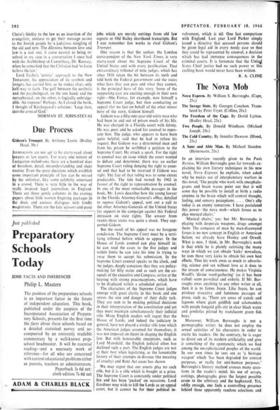Due Process
Gideon's Trumpet. By Anthony Lewis. (Bodley Head, 30s.) JOURNALISTS are not apt to be starry-eyed about lawyers or law courts. For every one minute of Lustgarten melodrama there are a hundred days of boredom, detail, misunderstanding and sheer routine. Even the great decisions which establish some important principle of law can be missed by the onlooker, like some celebrity unnoticed in a crowd. There is very little in the way of _ really inspired legal journalism in England. There are those gentle columns in the evening papers about little women fingering packages in the dock and curious dialogues with kindly Magistrates. There are the lazy scissors-and-paste jobs which are merely cuttings from old law reports or Old Bailey shorthand transcripts. But I can remember few works to rival Gideon's Trumpet.
One reason is that the author, the London correspondent of the New York Times, is very starry-eyed about the Supreme Court of the United States and with every justification. That extraordinary tribunal of nine judges, which has since 1816 taken the bit between its teeth and told both the Federal government and the states what laws they can pass and what they cannot, is the principal hero of this story. Some of the supporting cast are exciting enough in their own right—Abe Fortas, for example, now himself a Supreme Court judge, but then conducting an appeal (for no fee) on behalf of the other minor hero of the story, Gideon himself.
Gideon was a fifty-one-year-old white man who had been in and out of prison much of his life. He was charged in a Florida court with felony. He was poor and he asked for counsel to repre- sent him. The judge, who appears to have been quite helpful, said that he had to refuse his request. But Gideon was a determined man and from his prison he scribbled a petition to the Supreme Court. He struck a spark. For the right to counsel was an issue which the court wanted to debate and determine; there was an earlier Supreme Court ruling denying the right to coun- sel and that had to be reversed if Gideon was right. The fate of that ruling was to some extent predictable. The tide had turned by 1962 in favour of the right to representation by counsel. In one of the most remarkable passages in the book, Mr. Lewis describes how the young lawyer in the Florida Attorney-General's office, detailed to oppose Gideon's appeal, sent out a call to the other Attorney-Generals of the United States for support in the campaign against this Federal intrusion on state rights. The answer from twenty-three states was quite a shock. They sup- ported Gideon.
But the result of his appeal was no foregone conclusion. The Supreme Court must be a terri- fying tribunal before which to appear. In the House of Lords counsel can play himself in; he can read the cases to the five judges and within limits he can take his time in trying to sway them to accept his submission. In the Supreme Court counsel speaks to the clock, and the judges, deeply conscious that they are policy- making for fifty states and as such are the co- equals of the executive and Congress, arrive at the hearing with strong preconceptions, which have to be displaced within a scheduled period.
The characters of the Supreme Court judges emerge with great clarity in this book and one senses the size and danger of their daily task. They are seen to be making political decisions in their interpretation of the constitution and yet they must maintain simultaneously their judicial role. Many English readers will regret that the House of Lords, and indeed the judiciary in general, have not played a similar role (one which the American judges assumed for themselves; it was not imposed on them) in shaping the English law. But with honourable exceptions, such as Lord Mansfield, the English judicial ethos has declined such a part. The English judges are not at their best when legislating, as the lamentable history of their attempts in divorce (the meaning of cruelty) and Rent Act cases has shown.
. We may regret that our courts play no such role, but it is a role which is bought at a price. The Supreme Court is constantly under political fire and has been 'packed' on occasions. Lord Gardiner may wish to kill the Lords as an appeal court, but it cannot be for their political in- volvement, which is nil. One last comparison with England. Last year Lord Parker simply issued a directive that accused persons should be given legal aid in every needy case so that they could be represented by counsel, a decision which has had immense consequences in the criminal courts. It is fortunate that the Unit States Chief justice had no such power or this exciting book would never have been written.
R. A. CLINE






























 Previous page
Previous page